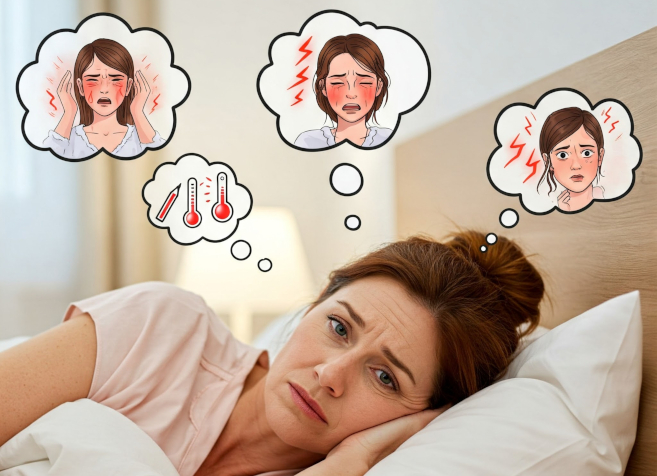
The journey through perimenopause and menopause often brings about significant changes, and one of the most disruptive can be sleep disturbances. If you’ve found yourself struggling with restless nights, you’re not alone. Understanding the reasons behind these challenges is key to finding effective solutions.
Why Sleep Gets Disrupted:
Several interconnected factors contribute to sleep problems during this transitional phase:
- Hormonal Changes: The fluctuating and declining levels of key hormones play a significant role:
- Estrogen: This hormone helps regulate sleep, mood, and body temperature. As estrogen levels drop, many women experience a decline in sleep quality.
- Progesterone: Known for its calming effects, progesterone also decreases during this time, making it harder to both fall asleep and stay asleep throughout the night.
- Melatonin: The body’s natural sleep hormone, melatonin production tends to decline with age, further contributing to difficulties in achieving restful sleep.
- Cortisol: This stress hormone can become imbalanced, especially when sleep is disrupted, creating a challenging cycle where poor sleep leads to increased stress, which further hinders sleep.
- Hot Flashes & Night Sweats: Sudden surges in body temperature, often triggered by hormonal shifts, can lead to repeated awakenings throughout the night, significantly fragmenting sleep.
- Mood Changes: Increased feelings of anxiety, irritability, or even depression, which are also influenced by hormonal fluctuations, can keep the mind racing and make it difficult to relax and fall asleep.
- Sleep Disorders: The risk of developing or experiencing worsened sleep disorders such as insomnia, restless leg syndrome, or sleep apnea can increase during perimenopause and menopause.
What You Can Do to Sleep Better:
Fortunately, there are strategies to improve sleep quality during this time:
- Hormonal Support: Addressing hormonal imbalances can be a very effective approach:
- Hormone Replacement Therapy (HRT): Combining estrogen and progesterone can be highly effective in managing sleep issues, as well as other common symptoms like hot flashes and mood swings. It’s crucial to discuss the individual risks and benefits of HRT with a healthcare provider to determine if it’s the right option for you.
- Bioidentical Hormones: Often prescribed by functional or integrative medicine practitioners, bioidentical hormones are tailored more closely to your individual natural hormone levels and may be another avenue to explore with a qualified practitioner.
Beyond hormonal support, lifestyle adjustments remain vital for improving sleep. Establishing a consistent sleep schedule, creating a relaxing bedtime routine, optimizing your sleep environment, and 1 managing stress are all important steps. Paying attention to diet and exercise habits can also positively impact your sleep.
Navigating sleep disturbances during perimenopause and menopause requires a comprehensive understanding of the contributing factors and a willingness to explore various solutions. By working with healthcare professionals at Touch MedSpa, you can develop a personalized plan that addresses your specific needs and helps you find the restful sleep you deserve.
